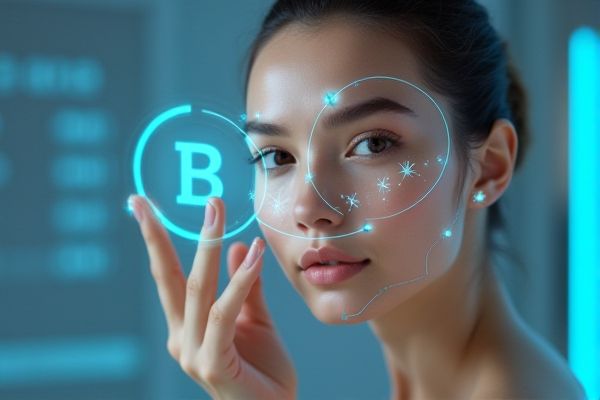
AI technologies enhance personalized skincare solutions by analyzing individual skin types, concerns, and preferences. Virtual skin diagnostics use machine learning algorithms to assess skin conditions and recommend targeted products tailored to users' needs. Chatbots provide 24/7 customer support, assisting buyers with product selection and addressing skin-related queries. Augmented reality tools allow users to virtually try cosmetics before purchasing, ensuring better satisfaction with beauty products.
AI usage in beauty and skincare industry
Personalized skincare recommendations
AI can analyze individual skin types and conditions to provide personalized skincare recommendations, leading to potential improvements in skin health. Companies like Proactive have begun implementing AI-driven assessments to customize their product offerings for users. By leveraging vast datasets, AI can identify patterns and suggest routines that cater specifically to each consumer's needs. This targeted approach may enhance customer satisfaction and loyalty within the beauty industry.
Virtual try-on technology
Virtual try-on technology in the beauty and skincare industry enables consumers to visualize products before making a purchase. This innovation can enhance customer satisfaction and reduce return rates. Brands like L'Oreal have adopted this technology, showcasing how it allows users to experiment with different looks digitally. As consumer preferences shift towards personalized experiences, the potential for increased sales and customer engagement remains significant.
Skin condition analysis
AI in the beauty and skincare industry offers the possibility of precise skin condition analysis, enhancing product recommendations. Technologies like deep learning can analyze skin types and issues, leading to customized solutions for consumers. For example, a brand like L'Oreal utilizes AI to assess skin health and suggest appropriate skincare routines. This approach can potentially improve customer satisfaction and brand loyalty through tailored experiences.
AI-driven beauty product formulations
AI-driven beauty product formulations offer the possibility of creating customized skincare solutions tailored to individual needs. By analyzing skin data and preferences, companies can enhance product efficacy, potentially leading to better consumer satisfaction. For instance, brands like Procter & Gamble utilize AI to formulate products that address specific skin conditions. This technology may also reduce time to market by streamlining the research and development process in the beauty industry.
Voice-activated skincare assistance
AI technology in the beauty and skincare industry enhances customer engagement and personalization. Voice-activated skincare assistance can provide tailored product recommendations based on skin type and concerns. Brands like Estee Lauder are exploring these innovations to streamline the shopping experience for consumers. This approach offers the possibility of improving customer satisfaction and increasing brand loyalty.
Real-time skin health monitoring
AI technology has the potential to revolutionize the beauty and skincare industry through real-time skin health monitoring. Companies like SkinVision utilize advanced algorithms to analyze skin conditions and detect issues early, improving treatment outcomes. Personalized product recommendations could also become more common, tailored to individual skin types and concerns. This could enhance customer satisfaction, leading to increased brand loyalty and sales for beauty brands.
Augmented reality makeup applications
AI usage in the beauty and skincare industry has the potential to enhance customer experiences through personalized recommendations. Augmented reality makeup applications allow users to virtually try on products before making a purchase, increasing the chance of satisfaction. Data-driven algorithms can analyze skin types and preferences to suggest suitable products, improving user confidence in their choices. Companies like L'Oreal are exploring these technologies to create engaging customer interactions and drive sales.
AI-powered beauty trend forecasting
AI usage in the beauty and skincare industry can enhance product development by analyzing consumer preferences and emerging trends. AI-powered beauty trend forecasting, for instance, enables brands to predict shifts in consumer demands more accurately. This can lead to tailored marketing strategies and personalized product recommendations, increasing customer satisfaction. By leveraging this technology, companies can gain a competitive edge in a rapidly evolving market.
Automated beauty customer service
AI can enhance customer experience in the beauty and skincare industry by providing personalized product recommendations based on individual skin types and concerns. Automated beauty customer service, such as chatbots, can offer immediate responses to inquiries, improving overall satisfaction. Brands like L'Oreal are already integrating AI to analyze customer feedback and tailor their offerings accordingly. This technology presents an opportunity for businesses to increase efficiency and potentially boost sales through targeted marketing strategies.
Sustainable and ethical AI beauty practices
AI technology has the potential to enhance product personalization in the beauty and skincare industry by analyzing individual skin types and preferences. Companies like L'Oreal are already exploring sustainable AI practices to optimize ingredient sourcing and reduce waste. Utilizing AI can lead to more effective formulations that align with ethical standards, appealing to environmentally conscious consumers. The integration of AI in beauty could increase brand loyalty by offering tailored solutions that meet the evolving demands of the market.
 techknowy.com
techknowy.com